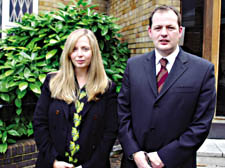|
|
 |
| |

Iain Croft and Heather Paterson, outside the coroner’s court: ‘We’ve lived through hell’ |
‘He was a beautiful boy... killed due to the errors of those we put our trust in’
Couple’s anguish as hospital admits failures over death of baby in childbirth
A CORONER’S inquest has revealed a catalogue of blunders made by staff on a Royal Free Hospital labour ward which led to the death of a baby during childbirth.
Riley Croft died of natural causes due to neglect, a St Pancras jury ruled on Tuesday.
The baby son of BBC journalists Iain Croft and Heather Paterson died of asphyxia at the Hampstead hospital on Good Friday in March 2005 after midwives failed to notice the child’s heart rate had dropped to a dangerous level.
It had been falling while Riley was in his mother’s womb and continued to drop after birth. Medical staff had been warned for more than four hours that the rate had been slipping but pleas for help were ignored.
Ms Paterson said: “I just hope no one else ever has to go through this. In this day and age these things shouldn’t happen. Life will never be the same.”
The couple moved from their flat in West End Lane, West Hampstead, because they were haunted by being able to see the hospital from their home.
Mr Croft said: “They took away the thing most precious to us. We’ve lived through hell for two years. The night itself was the worst night in our lives.
“One error is a mistake, a series of fatal errors by three individuals is indicative of systematic failure.
“He was a beautiful boy. He was killed due to the errors of those we put our trust in.”
Mr Croft, who has notes of comments made by staff on the labour ward, told the inquest the couple were turned away from an initial appointment to induce Riley.
He added: “They said no beds were available. In fact, we were taunted by some staff, who said: ‘There’s no room at the inn, you’ll have to go home’.”
When Ms Paterson was admitted the next day, Dr Ramesan Navaratnarajah, a specialist registrar in obstetrics and gynaecology, prescribed 1 to 2 milligrams of induction drug Prostin, a departure from the hospital’s policy of 1mg.
When asked why, Dr Navaratnarajah said: “It was a mistake. Basically, I was maybe a bit overworked. I went back to what I was used to as opposed to 1mg as per hospital policy.”
The hospital had changed its policy over the use of Prostin after a baby died in similar circumstances in 2001.
The inquest heard how midwife Ine Toby, 67, miscalculated the state of Ms Paterson’s uterus, gave her double the hospital’s recommended first dose of Prostin, failed to take adequate medical notes and dismissed Ms Paterson’s concerns as those of a “fussy” first-time parent.
Mr Croft said Ms Toby told his wife: “You’re a silly girl, you don’t deserve this baby. I’m going to take it off you.”
His wife was writhing in agony and screaming for help. “Repeatedly through this time I was begging to see a doctor,” said Mr Croft.
Ms Toby told the inquest she was unaware the hospital had changed its guidelines, and denied making comments to the patient, adding: “I’m not a young hoodlum. I wouldn’t say that.”
The couple were taken to the labour ward, where they declined the help of a student nurse.
Sister Beverley Blankson, who took over Ms Paterson’s care, told the inquest she was too busy to give her “the care she deserved”.
She examined Ms Paterson but then went to deliver another child, telling Mr Croft to monitor the baby’s heart rate and press a buzzer if it dropped below a certain level.
It dropped three times and Mr Croft raised the alarm but no one came to the couple’s aid, the inquest heard.
Mr Croft said Ms Blankson “kept leaving us, kept telling us not to be fussy”. He added: “I pointed out that the baby’s heart rate was dropping. I was made to feel too cautious and each time I was left alone.”
Ms Paterson told of her shock when she looked at the record of the baby’s heart scan (CTG) after Riley died and realised just how low it had dropped.
She said: “On that fateful morning. I had a look at the CTG and I just thought: Oh my God, what am I looking at?”
Ms Paterson was seen by a doctor at 9pm on the evening before Riley was born, but not again until 7.30am the next morning just before she gave birth.
Mr Croft said: “For 35 minutes the room was filled with doctors attending to the baby. At 8.28am they asked for permission to stop. Our boy was dead.”
Consultant Heather Evans said Riley probably would have survived if doctors had been called at 4am, when his heart rate first dropped.
A hospital spokeswoman said: “We accept there were failures in our care. We apologise unreservedly to Riley’s parents and would like to convey our deep condolences to them and their families.
“Following Riley’s death, a board-level inquiry was immediately undertaken. As a result, the trust has implemented changes in procedure in both clinical practice and communications to prevent a similar incident.
Two midwives involved in Ms Paterson and Riley’s care have undergone additional training.” Midwives and medical staff have been given extra training and regular reviews of maternity services are undertaken.
Coroner Dr Andrew Reid will now write to relevant health care authorities to endorse the conclusions and recommendations made by the hospital and “to notify other bodies of the lessons learned”.
Verdict: Natural causes to which neglect contributed |
 |
|
| |
| Your Comments: |
| |
| |
| |
|
 |
|